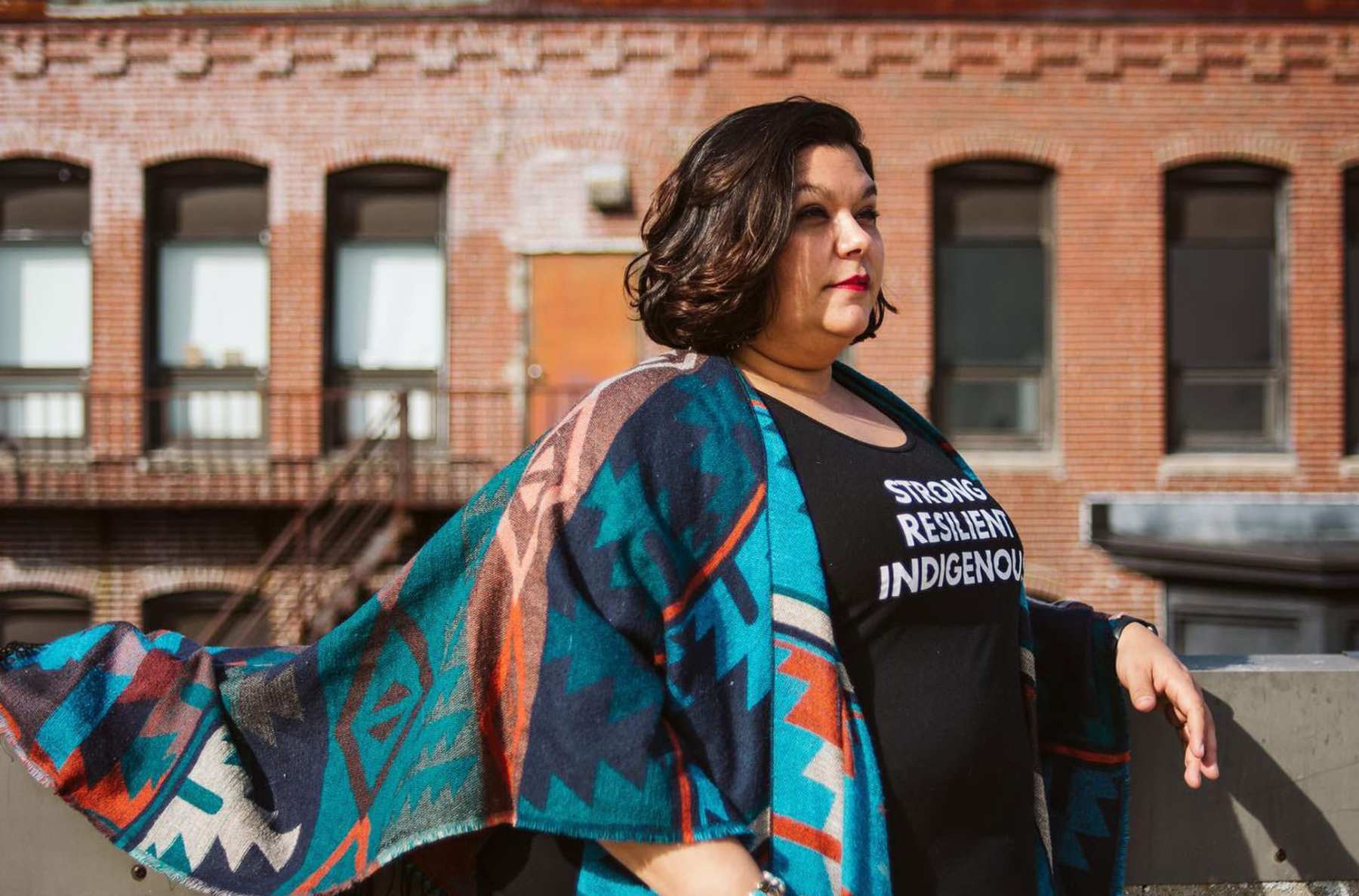April Fournier remembers the moment she finally decided to run for a seat on her city council in Portland, Maine.
The 40-year-old community organizer was watching one of the council’s virtual meetings this summer on the topic of homelessness. At the time, unhoused protesters had created an encampment outside of city hall to highlight the rising number of people without permanent shelter during the coronavirus pandemic. A person who was logged in said they were sleeping outside of the building.
A council member instructed the person to email officials, noting it wasn’t time for public testimony. The exchange struck Fournier.
“Just the lack of empathy, the lack of just being able to see outside of your own bubble to understand that this person that’s trying to get their perspective across is sleeping on your steps,” said Fournier, a Democrat. “They don’t have a house so they likely don’t have a computer to email you; they’re borrowing somebody else’s phone and they are pleading essentially for their life. And you’re going to pull procedure on them? At that point I was like, ‘Enough.’”
Fournier announced her candidacy for an at-large seat on the nine-member city council shortly after.
This election cycle may be most remembered for its consequential presidential showdown or the election of the first woman of color as vice president. There were also expensive matchups for the U.S. Senate, and statehouse outcomes that helped determine redistricting for the next decade.
For Fournier, it will also be the year she made history. She won in the November election. And as a member of the Diné (Navajo) Nation, she is the first Indigenous person elected to serve on the council.
She is among the women of color who won historic “firsts” in local races around the country. The candidates, who are predominantly Democrats, will serve in spaces like city councils, county government and school boards.
In Arizona, Democrat Gabriella Cázares-Kelly, a member of the Tohono O’odham Nation, was elected as Pima County recorder and will be the first Indigenous person in the position. Democrat Nida Allam, who won a seat on the Durham County Board of Commissioners in North Carolina, will be the first Muslim woman elected to public office in the state. Amáda Márquez Simula will be the first Latina mayor of Columbia Heights, Minnesota, and the city’s first non-White elected official.
“Everyone is discussing how it was Black, brown and Indigenous voters, young women, unmarried women, that drove the victory really for Vice President Biden,” said A’shanti Gholar, president of Emerge, an organization that supports Democratic women candidates. “But the fact is they were also the most exciting candidates.”
Erin Vilardi is the founder and CEO of Vote Run Lead, a training program for women of all political backgrounds to run for office. She said of the 221 alumni of their training on the November ballot, 87 were women of color; at least 71 percent of them won those local, state and federal races.
The takeaway, according to Vilardi: “Women of color are electable.”
Women of color have increasingly gained political representation in Congress and statehouses. But there is no comprehensive data available on the racial and gender demographics of the people who serve on nearly 40,000 township, municipal and county governments in the country.
Some preliminary data on the gender of local officeholders suggest shortcomings that mirror dynamics in federal and state offices, where women hold 23.7 percent of the 535 congressional seats and represent 29 percent of state legislatures.
The gender gap in local government is “nearly identical” to higher levels of government, according to new research by CivicPulse, a nonprofit firm that used U.S. Census data for its methodology (there is no data from them on transgender representation, though other databases are available). The research concluded that in all three levels of government, women are the least likely to serve as elected executives and most likely to serve as legislative staffers in federal and state levels and clerks on the local level.
The coronavirus pandemic and a reckoning on racial injustice laid bare just how much national issues over policing, public education and health care are decided on the local level. Women of color sought to be key decision makers on a range of issues impacting their communities, said Kandice Harris, the Midwestern regional director of Run for Something, an organization that supports young Democratic candidates.
“These really local offices are the places where people can make a difference in their community,” she said. “They’re positions that touch people in a much more direct way.”
Their wins preview a more diverse pipeline of political power, especially for Democrats, said Ross Morales Rocketto, co-founder of Run for Something.
“Our future presidents, future members of Congress, future governors, are people who are starting at the state and local level,” he said. “If we’re going to truly build a pipeline, that’s where it needs to start.”
Democrat Mai Xiong won a seat this month to her board of commissioners in Macomb County in eastern Michigan. Xiong, a Hmong American who came to the United States from a refugee camp in Thailand when she was three years old, will be the first Asian American to be elected to the board.
The 35-year-old mother of four defeated a popular incumbent. Xiong said she made extra outreach calls and literature drop-offs, along with additional fundraising, to prove that she could run a successful campaign.
“As a woman who has young children and as a woman of color, it’s really hard to break through that glass ceiling,” she said.
Xiong, who designs clothes for her own clothing store, said she’s not sure if she would have had a successful run for office a few years ago. But her community’s changing demographics showed there was a hunger for change in elected representation, she said. Two Black women will also join her on the board when she’s sworn in.
Xiong plans to help other women of color follow in her footsteps. She wants more Asian American women to run for public office in her county and state.
“I don’t want to be the first and the last,” she said.
Jean Sinzdak is associate director of the Center for American Women and Politics at Rutgers University. She said that though women of color have gained ground in recent election cycles, they have faced additional barriers, especially in the primary, to prove they can win. Groups focused on supporting candidates of color have started to emerge in recent election cycles, which could help make a difference.
“It just seems like it’s been such an incremental pace, and they finally are sort of breaking through,” Sinzdak said.
Gholar said it’s important to note that though White women got the right to vote a century ago, Black women and women of color were granted the same privilege just a few decades ago. That means they’re playing catch up in running for elected office.
“We’re still going to see “firsts” because it hasn’t been an equal playing field for us,” she said. “And even the investment hasn’t been there from the beginning.”
Fournier, in Maine, said some of the people who chose not to support her candidacy questioned her experience to run for city council. As the special services manager for a local Head Start agency, she dismissed the notion. She hopes other women running for office do as well.
“I have experience putting four children through Portland public schools. I have experience working as an educator and an advocate in lots of different arenas trying to bring people together to make collaborative decisions,” she said. “So the narrative of, ‘You have to have a certain type of experience to be able to be successful in a role like this,’ is one that I’m not interested in moving forward. I think you can have lots of different types of experience and be successful in these roles.”
When Maria Vismale decided to run for the Baltimore City Council, the 31-year-old saw it as an opportunity to help her community. That included expanding community-based diversion programs for first time, non-violent offenders and examining the $3 billion budget to see how residents could see lower property taxes.
“City council plays such a huge role that if what you would like to do is see change, you have to first get involved at the municipal level,” she said.
As a Black Republican woman, Vismale is a rarity in a party that has struggled with appealing to people of color. More women of color in elective office are Democrats. She acknowledged the difficulty of running for office when so many people ask about national politics. She ultimately lost her race in a predominately Democratic area.
Many of the women of color who made headlines for their local office wins are Democrats. Although Republican women of color made gains in congressional races, the scope of their wins on a more local level is more muted. That’s according to Kodiak Hill-Davis, a founder and political director for Republican Women for Progress. The group supported a handful of Republican women this election cycle, including Republican women of color, in both local and state offices. Several of them lost in primaries and the general election.
Hill-Davis said the gains in congressional seats are promising. But it hides an underlying problem for the party if they’re not building below. She said it’s something the Republican Party apparatus has to address, and financial investment will be critical.
“I think when you look at how our political structure works, if you don’t have the pipeline coming up through local elected office it’s much harder traditionally to make any kind of headway to running for federal office,” she said. “Just because you’re not really a known quantity within your local party structure.”
Data from CivicPulse shows that counties that tend to vote Democratic in presidential races elect more women officials. In the most Democratic-leaning counties, women make up 30 percent of officials, compared to 21 percent in most Republican-leaning counties.
Vismale ran for office at a time when Republican candidates were asked to defend President Donald Trump, a polarizing figure, particularly for women (though preliminary data shows White women stuck by Trump). Vismale, who tried not to weigh in publicly on the president, focused on her race. She received some derogatory comments online during the campaign for being a Republican, but she also said she received a lot of support from the community. In retrospect, Vismale noticed in the final days of the election that the presidential race impacted her pitch to voters.
“That became the center focus that really overshadowed,” she said. “And I think my opponent used that to their advantage, especially when I was articulating not only my platform but my vision,” she said.
Other races further highlighted how national politics seeped into local races. In Georgia, Karen Watkins didn’t see anyone like her on the five-member Gwinnett County Board of Education. The school system, located in the metro Atlanta area, is the largest in Georgia and the 12th largest in the country with more than 140 schools.
Watkins, who works in supply chain management within commercial real estate, said having a parent on the school board is important for policy decisions. The mother of two said no one on the board was a parent of school-age children.
“It’s relevant because we feel the policies,” she said.
While Watkins made the decision last year to run for the school board, the plan felt more urgent because of the pandemic. The virus has highlighted inequities in education, especially as school districts around the county consider different plans for reopening schools.
Watkins was elected, becoming one of the first Black women to be elected to her school board (Watkins was one of three Democratic women of color running for the board. One of the other candidates, Tarece Johnson, defeated a longtime member of the board in the June primary and will join Watkins.)
But the race turned ugly in its final weeks. In October, a digital ad insinuated that children in the district would not be safe if the women candidates of color were elected. Republicans also rallied behind a write-in candidate to try to defeat Johnson.
The ad, by the conservative Family Policy Alliance, accused the women of being “radical liberals” who will support “radical sex indoctrination,” removing safety officers from schools and teaching children “a false version of American history.”
Watkins called the ad racist for its language imagery, which focused primarily on White children. The county’s population is more than 60 percent people of color.
“It is filled with dog whistles,” Watkins said of the ad.
Around the country, other candidates faced disparaging attack ads. This was a record-shattering year for LGBTQ+ candidates, but several saw an uptick in discriminatory ads in their races.
Watkins told The 19th that the episode highlighted the importance of representation in the race. She said her win shows the community effectively rejected the hate reflected in the ad. She hopes there’s a lesson for candidates elsewhere who face similar attacks.
“If we are able to get people civically engaged, we will prevail,” she said.






